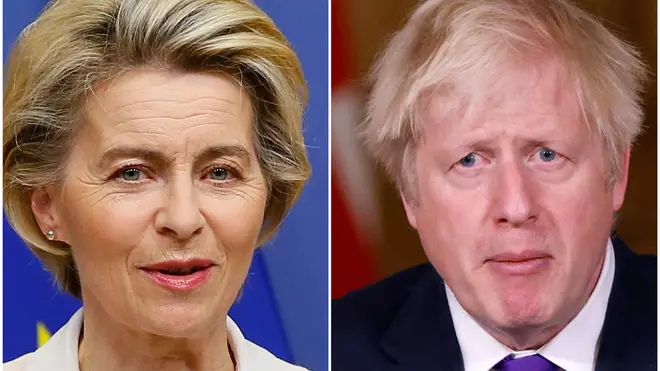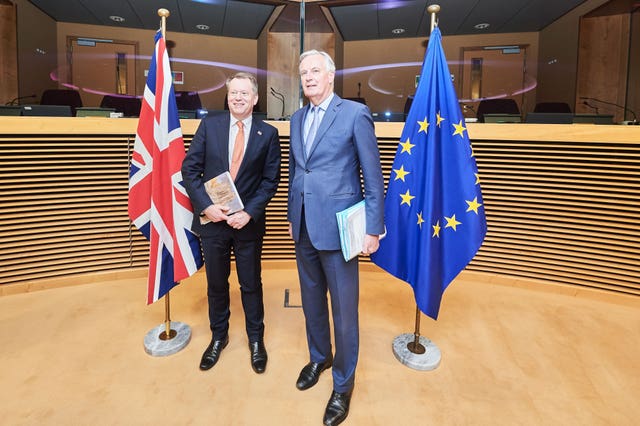
Shelagh Fogarty 1pm - 4pm
7 December 2020, 23:04

The Prime Minister will head to Brussels for face-to-face talks with Ursula von der Leyen.
Boris Johnson will travel to Brussels for talks with Europe’s top official in a late bid to break the deadlock in negotiations on a post-Brexit trade deal.
The Prime Minister and European Commission president Ursula von der Leyen agreed to the meeting after a lengthy telephone call to take stock of the faltering negotiations.
Despite the commitment to a face-to-face meeting, the pair acknowledged significant differences remained with time running out before current trading arrangements expire at the end of the month.
This evening I spoke with @EU_Commission President @vonderleyen .
We have asked our Chief Negotiators and their teams to prepare an overview of the remaining differences to be discussed in a physical meeting in Brussels in the coming days.
Full statement: https://t.co/NcB2Aq9j2Q pic.twitter.com/cj7bmibDa3
— Boris Johnson (@BorisJohnson) December 7, 2020
UK sources said “no tangible progress” had been made during the negotiations, which were now looking “very tricky”.
In a joint statement, Mr Johnson and Ms von der Leyen said: “As agreed on Saturday, we took stock today of the ongoing negotiations.
“We agreed that the conditions for finalising an agreement are not there, due to the remaining significant differences on three critical issues: level playing field, governance and fisheries.
“We asked our chief negotiators and their teams to prepare an overview of the remaining differences to be discussed in a physical meeting in Brussels in the coming days.”
Their second call in a little over 48 hours came after Michel Barnier and his UK counterpart Lord Frost spent the day talking in Brussels.
The negotiators spent the last week talking in London, but the stalemate continues with major differences on the three issues which have blocked progress for months.
A senior Government source said: “Talks are in the same position now as they were on Friday. We have made no tangible progress.”
Hopes now rest on an intervention by Mr Johnson and Ms von der Leyen to rescue the process.
With @BorisJohnson we took stock of the negotiations. The conditions for an agreement are not there due to remaining differences on critical issues. We asked our Chief Negotiators to prepare an overview of the remaining differences to be discussed in person in the coming days. pic.twitter.com/rWCWlMz0dv
— Ursula von der Leyen (@vonderleyen) December 7, 2020
“It’s clear this must now continue politically,” the source said.
“Whilst we do not consider this process to be closed, things are looking very tricky and there’s every chance we are not going to get there.”
Downing Street said earlier on Monday that it was prepared to continue talks for “as long as we have time available”, but admitted time was in “very short supply”.
The comments appeared to be at odds with the EU’s chief negotiator Mr Barnier, who reportedly told MEPs the deadline for talks succeeding is Wednesday.
The meeting between Mr Johnson and Ms von der Leyen is not expected to take place on Tuesday, leaving Wednesday and Thursday as the most likely days.
Leaders of the EU’s 27 member states are due to gather in Brussels on Thursday for a two-day summit, potentially giving political impetus for a deal.
The UK leaves the single market and customs union at the end of December and businesses already face major changes to their trading relationship with the EU from January 1.

Failure to reach a deal would add additional barriers and tariffs, and the Office for Budget Responsibility has warned the disruption could wipe 2% off gross domestic product – the standard measure of the size of the economy – in 2021.
Meanwhile, Cabinet Office minister Michael Gove met his counterpart on the UK-EU joint committee in Brussels, although the discussions are separate from the trade negotiations.
But in an olive branch to Brussels, the Government said it was prepared to remove three controversial clauses from the UK Internal Market Bill relating to the Irish border.
The gesture comes despite MPs voting on Monday to put the clauses back into the Bill after they were taken out by peers.
In a statement before the vote, the Government said the UK and EU have “worked constructively together through the Withdrawal Agreement Joint Committee”.
“Discussions continue to progress and final decisions are expected in the coming days. If the solutions being considered in those discussions are agreed, the UK Government would be prepared to remove clause 44 of the UK Internal Market Bill, concerning export declarations.
“The UK Government would also be prepared to deactivate clauses 45 and 47, concerning state aid, such that they could be used only when consistent with the United Kingdom’s rights and obligations under international law.”
Trade experts questioned how much the concession would sway Brussels.
Contain your excitement folks. As trust building measures go the offer not to break treaty if you get what you want is about as limited as you can get.
An olive leaf at best, definitely not the branch. And not a sign of a government confident to make concessions.
— David Henig (@DavidHenigUK) December 7, 2020
David Henig, of trade think tank the European Centre For International Political Economy, said: “As trust-building measures go the offer not to break (a) treaty if you get what you want is about as limited as you can get.
“An olive leaf at best, definitely not the branch. And not a sign of a government confident to make concessions.”
Any deal would have to be ratified by both Houses of Parliament in the UK and the European Parliament as well as signed off by EU leaders.
France has publicly warned it will veto any deal if it is unhappy with the terms, amid signs President Emmanuel Macron is anxious that Mr Barnier is preparing to give too much ground in his determination to get a deal.